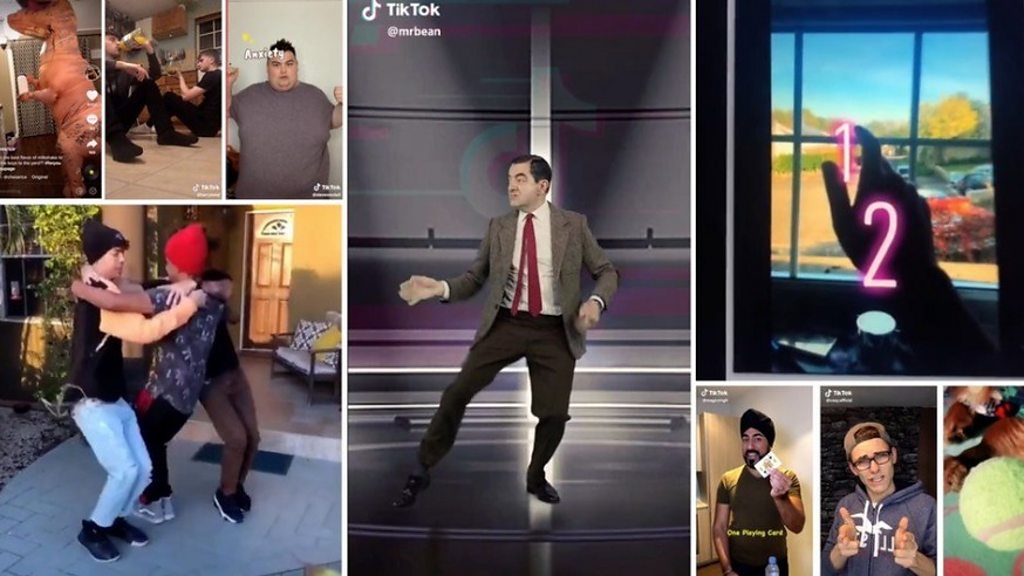TikTok's Young Fans 'exploited' For Digital Gifts


Media playback is unsupported on your device
Video-sharing app TikTok says it is "sorry" that some children and other young people have felt pressured into sending money to their favourite influencers on the app.
TikTok lets fans send their favourite videomakers "digital gifts", which can cost up to £48.99.
A BBC investigation found influencers promising to share their phone numbers with fans in exchange for the gifts.
TikTok said it would strengthen its policies and guidelines but did not explain exactly how.
Claire (not her real name) told BBC News she regretted spending £100 to obtain her favourite TikTok star's phone number - and he had never answered his phone.
Claire, 12, who lives in the north-west of England, sent TikTok star Sebastian Moy a £48.99 "drama queen" gift to show her appreciation for his videos.
And when he had asked for another one in exchange for his personal phone number, she said she was swept up in the moment.
The US-based video-maker has 3.8 million fans on TikTok and has not broken any of the app's rules.
He has not responded to the BBC's requests for comment.
Taking a cut
TikTok is the fastest-growing social media app, with about 500 million regular users, although the company doesn't disclose its userbase. It's estimated to have been downloaded more than a billion times on app stores.
The app lets people post 15-second videos. It is known for clips of teenagers lip-syncing and dancing to the latest trending music.
The company says it is most popular with 16- to 24-year-olds but there is evidence that many users are under 13, which is against the app's rules.
The firm has already been fined $5.7m (£4.5m) by a US regulator after being accused of collecting under-13s' personal details without their parents' consent. And on Tuesday, the UK's Information Commissioner revealed she had also launched an inquiry into whether the app was doing enough to safeguard its youngest users.
"We do have an active investigation into TikTok right now, so you can watch that space," said Elizabeth Denham.
Videomakers with more than 1,000 followers are allowed to broadcast live on the platform. It is during these live streams that fans can send digital gifts to show their appreciation.
Gifts appear as on-screen animations and cost between 5p and £48.99. The app's biggest stars can earn thousands of pounds in one live stream.
TikTok declined to say how much of that money it kept - but several influencers told the BBC they took home 50% of all gift revenue earned.
Promised rewards
Over 10 weeks, the BBC monitored dozens of live streams in which the app's stars asked fans for gifts.
In exchange, they promised shoutouts on their live streams, said they would follow back fans on social media or offered to make "duets", which allow users to collaborate with TikTok stars in a split-screen video.

Media playback is unsupported on your device
One creator promised to talk to a fan on Instagram "for a week" and was given three gifts worth a total of £147.
Some creators routinely offered personal messaging details and phone numbers in exchange for gifts.
The BBC also found a group who scoured the app for people giving gifts and then contacted them directly asking for money in exchange for "likes" and "follows".
Exploited
Stephanie Barbour, from Toronto, found her 11-year-old daughter had run up a bill for $400 (£240).
"I was shocked when I found out what the money was spent on," she said.
"I said to my daughter, 'So you don't actually get anything for it?' and she said, 'No.'
"Adults should know better. And even other teenagers should know better - that you do not ask children for money."
Another TikTok fan, Kelly, told the BBC she had spent £500-£600 of her own money on digital gifts. She no longer sends them because she feels she was exploited.
"I understand people need to make money these days off social media but I just think it's force-fed down young people's throats that they need to pay money to get attention or feel appreciated," Kelly said.
Rhys, 20 said he had spent more than £1,000 without realising it.
"Gifting on TikTok is a little bit like gambling," he said "It gets addictive. I really didn't see anything wrong with it at the time but now I don't think it's worth it.
"I have nothing to show for it. It was my personal choice but I do think there should be some sort of age restriction or timeout function."
The BBC contacted several of the TikTok stars seen using such techniques but most of them did not reply.
Feeling guilty
The Neffati brothers have amassed 2.5 million followers in just six months on the platform.
The 25-year-old Polish twins who live in Blackburn, Lancashire, are famous for their dancing and comedy sketches.
They offer to follow back fans in exchange for a "drama queen" gift, worth £49 and promise to write fans' names on their heads if they send multiple gifts.
They told the BBC that they had only started offering perks in exchange for gifts because they had been receiving them regularly.
They said they were simply following the lead of other creators on the platform and that most of the fans that sent gifts were about 30 years old.
But they said they did feel guilty when they received gifts from young fans.
"We don't like it when our gifters are young, so basically we ask them if their parents know about it," they said.
"But we can't stop them. We can't stop it. We are going live not only for the money but we are going on the live to get more audience."
Rhia, from south Wales, and has 2.5 million fans thanks to her creative video-editing skills.
She said her average fan was about 10 to 14 years old and they were always happy with the perks she offered in exchange for gifts.
But she also feels uncomfortable when she receives several gifts from very young followers.
And she would like to see stricter age limits on gifting.
"It would give us peace of mind as creators," she told the BBC.
"It would make you feel more ethical because taking money from children is not a good way to earn a living really."
Deceptive
Livestream gifting originated in China, where the practice is far more popular. Professional "cam girls" earn huge amounts from their audiences.
In the West, tipping has become more common especially on gaming platform such as Twitch.
However, the rapid rise of TikTok is testing the business model like never before.
Bytedance, the Chinese company that owns TikTok, declined to answer specific questions but told the BBC it was investigating digital gifting.
In a statement, it said: "We do not tolerate behaviours that are deceptive in nature and we are sorry to hear some of the users' experiences.
"We recognise there is always room for improvements in terms of making guidelines and information more accessible, clear and easy-to-understand for all users.
"We value your feedback and will further strengthen our policies and product features."
The company gave no details on what policies or community guidelines it would change.
Alessandro Bogliari, from the Influencer Marketing Factory, said there was wider pressure on TikTok to make changes.
"These sorts of stories are not good for a social network that is becoming popular with brands and marketers," he said.
"The app has major potential but there is clearly work to do to improve things.
"I think more parental-control features would be a good idea and some sort of cap on the amount users can gift per day or per livestream.
"They could also make the guidelines more clear and ban the use of certain terms that 'hard sell' to users."
From Chip War To Cloud War: The Next Frontier In Global Tech Competition
The global chip war, characterized by intense competition among nations and corporations for supremacy in semiconductor ... Read more
The High Stakes Of Tech Regulation: Security Risks And Market Dynamics
The influence of tech giants in the global economy continues to grow, raising crucial questions about how to balance sec... Read more
The Tyranny Of Instagram Interiors: Why It's Time To Break Free From Algorithm-Driven Aesthetics
Instagram has become a dominant force in shaping interior design trends, offering a seemingly endless stream of inspirat... Read more
The Data Crunch In AI: Strategies For Sustainability
Exploring solutions to the imminent exhaustion of internet data for AI training.As the artificial intelligence (AI) indu... Read more
Google Abandons Four-Year Effort To Remove Cookies From Chrome Browser
After four years of dedicated effort, Google has decided to abandon its plan to remove third-party cookies from its Chro... Read more
LinkedIn Embraces AI And Gamification To Drive User Engagement And Revenue
In an effort to tackle slowing revenue growth and enhance user engagement, LinkedIn is turning to artificial intelligenc... Read more

